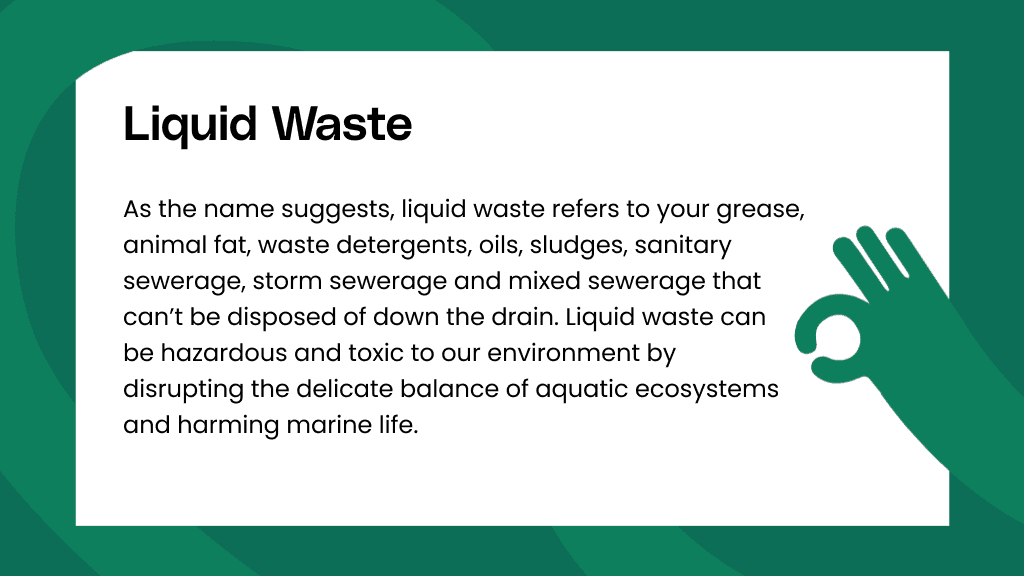Reclaim Waste - The Facts
Reclaim Waste - The Facts
Blog Article
Not known Incorrect Statements About Reclaim Waste
Table of ContentsReclaim Waste - The FactsNot known Details About Reclaim Waste Not known Facts About Reclaim WasteExcitement About Reclaim WasteGet This Report about Reclaim Waste
Residential sewer waste refers to the waste and items from a household septic storage tank. The correct administration and disposal of residential sewage waste call for liquid waste to be moved to a sewer treatment plant where the proper techniques and devices are used to cleanse and dispose of waste.
Business waste usually includes possible hazards, such as combustible materials or a mix of fluid and solid waste products, and needs an advanced and detailed disposal process. The disposal of industrial waste commonly involves the purification of waste prior to transportation to make sure secure and appropriate disposal. Hazardous waste is created from byproducts and overflow of commercial procedures and manufacturing.
This type of waste can not make use of the very same sewer administration transportation or processes as septic or business fluids. The commercial waste management process calls for the examination and screening of liquid waste before it undergoes the disposal process (liquid waste disposal melbourne). Overflow waste is the liquid waste that comes from overflow and excess stormwater in very booming areas or cities
Runoff waste can trigger contamination and flooding if not dealt with correctly. Ensuring proper waste management can protect against calamities and decrease environmental harm.
The Definitive Guide to Reclaim Waste
Call PROS Services today to discover regarding our waste management and disposal services and the correct methods to care for the liquid waste you produce.
(https://leonaube33101.wixsite.com/reclaim-waste/post/effective-liquid-waste-removal-and-disposal-everything-you-need-to-know)Do you know what occurs to your water when you disengage, flush the commode or drain pipes the cleaning device? No? Well, it deserves understanding. This so-called 'wastewater' is not just an essential resource but, after therapy, will be released to our land, rivers or the sea. Made use of water from commodes, showers, baths, cooking area sinks, washings and industrial procedures is referred to as wastewater.

water made use of to cool equipment or clean plant and tools). Stormwater, a form of wastewater, is drainage that flows from farming and urban locations such as roofing systems, parks, yards, roads, paths and gutters right into stormwater drains, after rain. Stormwater moves untreated directly to regional creeks or rivers, eventually getting to the sea.
Some Of Reclaim Waste
In Queensland, most wastewater is treated at sewage treatment plants. Wastewater is delivered from residential or commercial websites with a system of sewage systems and pump terminals, recognized as sewerage reticulation, to a sewage treatment plant.
The Department of Natural Resources encourages neighborhood governments concerning handling, operating and preserving sewage systems and treatment plants. In unsewered areas, local governments might require homeowners to mount specific or house sewer treatment systems to treat residential wastewater from bathrooms, cooking areas, washrooms and washings. The Department of Natural Resources authorizes using home systems when they are shown to be efficient.
In some new subdivisions, therapy of some stormwater to get rid of trash, sand and crushed rock has started making use of gross toxin traps. Wastewater treatment takes place in four phases: Gets rid of solid issue.
Makes use of tiny living microorganisms understands as micro-organisms to damage down and get rid of continuing to be dissolved wastes and fine bits. Micro-organisms and wastes are integrated in the sludge.
10 Simple Techniques For Reclaim Waste
Nutrient elimination is not available in any way sewage therapy plants due to the fact that it needs costly specialist equipment. It is coming to be much more usual in Queensland. Clear fluid effluent produced after treatment may still consist of disease-causing micro-organisms. If this effluent is released right into rivers such as rivers or the sea, the micro-organisms will eventually die out.

This typically implies wastewater has to be dealt with or contaminants gotten rid of prior to it can be discharged to waterways. Most wastewater moves into the Continue sewerage system. Under the Act, local federal governments provide approvals and permits for ecologically relevant activities (Periods) including wastewater launches that may have a local impact. The division provides approvals and permits to Ages involving wastewater releases that could have a regional or statewide influence.
Some Known Factual Statements About Reclaim Waste
Monitoring gives valid information concerning water quality and can validate that permit conditions are being fulfilled. The details gotten via tracking supplies the basis for making water high quality decisions.
Report this page